Related Research Articles

The Tephritidae are one of two fly families referred to as fruit flies, the other family being the Drosophilidae. The family Tephritidae does not include the biological model organisms of the genus Drosophila, which is often called the "common fruit fly". Nearly 5,000 described species of tephritid fruit fly are categorized in almost 500 genera of the Tephritidae. Description, recategorization, and genetic analyses are constantly changing the taxonomy of this family. To distinguish them from the Drosophilidae, the Tephritidae are sometimes called peacock flies, in reference to their elaborate and colorful markings. The name comes from the Greek τεφρος, tephros, meaning "ash grey". They are found in all the biogeographic realms.

The Tephritoidea are a superfamily of flies. The following families are included:
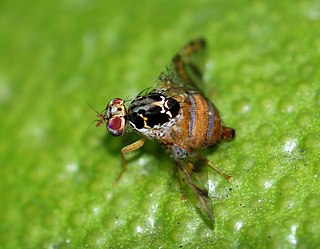
Ceratitis capitata, commonly known as the Mediterranean fruit fly or medfly, is a yellow and brown fruit pest that originates from sub-Saharan Africa. C. capitata has no near relatives in the Western Hemisphere and is considered to be one of the most destructive fruit pests in the world. There have been occasional medfly infestations in the states of California, Florida, and Texas that required extensive eradication efforts to prevent the fly from establishing itself in the US.
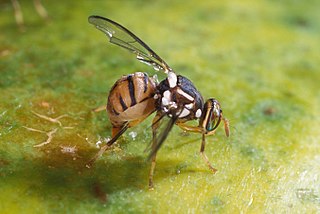
Bactrocera is a large genus of tephritid fruit flies, with close to 500 species currently described and accepted.
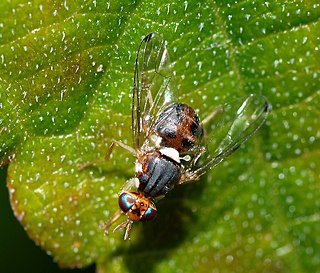
The Dacinae are a subfamily of the fruit fly family Tephritidae. Its 41 genera are distributed among three tribes:
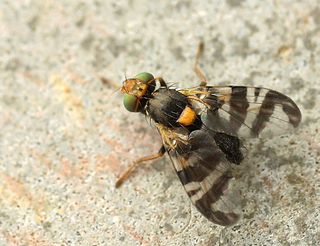
Rhagoletis cerasi is a species of fruit fly in the family Tephritidae.
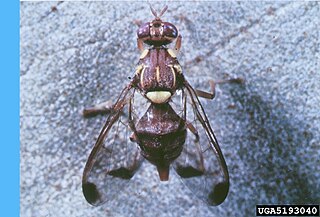
The melon fly(Bactrocera cucurbitae) is a fruit fly of the family Tephritidae. It is a serious agricultural pest, particularly in Hawaii.

Campiglossa is a genus of fruit flies in the family Tephritidae. There are at least 190 described species in Campiglossa.

Anastrepha is the most diverse genus in the American tropics and subtropics. Currently, it comprises more than 300 described species, including nine major pest species, such as the Mexican fruit fly, the South American fruit fly, the West Indian fruit fly, the sapote fruit fly, the Caribbean fruit fly, the American guava fruit fly, and the pumpkin fruit fly, as well as the papaya fruit fly. As some of their names suggest, these pest species cause damage in commercial fruits such as citrus, mango, guava, and papaya.

Dacus is a genus of tephritid or fruit flies in the family Tephritidae.
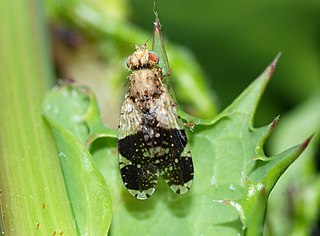
Tephritis is a genus of flies. It contains around 170 described species, making it the sixth largest genus in the family Tephritidae. Many more undescribed species are known from specimen collections. Tephritis occur throughout much of the world, but most are Palearctic. They can be found in a wide range of climate types, from hot semidesert to tundra. Most species inhabit the inflorescences of plants from several tribes in the family Asteraceae, and a few species cause galls to form.

Terellia is a genus of tephritid or fruit flies in the family Tephritidae.

Urophora is a genus of tephritid or fruit flies in the family Tephritidae.
Ceratodacus priscus is a species of prehistoric fly, which probably belongs in the family Tephritidae. It is known from a single male fossil, preserved in Dominican amber from the El Mamey Formation of the Cordillera Septentrional. The species is characterised by the presence of long setulae on the arista.
Fruit fly may refer to:

The Mexican fruit fly also known as Anastrepha ludens and the Mexfly is a species of fly of the Anastrepha genus in the Tephritidae family. It is closely related to the Caribbean fruit fly Anastrepha suspensa, and the papaya fruit fly Anastrepha curvicauda.
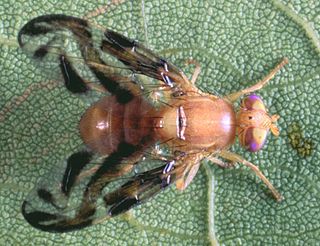
Anastrepha suspensa, known as the Caribbean fruit fly, the Greater Antillean fruit fly, guava fruit fly, or the Caribfly, is a species of tephritid fruit fly. As the names suggest, these flies feed on and develop in a variety of fruits, primarily in the Caribbean. They mainly infest mature to overripe fruits. While thought to have originated in Cuba, the Caribbean fruit fly can now also be found in Florida, Hispaniola, and Puerto Rico.
Ceratitis rosa, the Natal fruit fly or Natal fly, a species from the family Tephritidae of the order Diptera, is a fruit fly. It was described in 1887 from specimens of Delagoa Bay, Mozambique.

Tephritini is a tribe of fruit flies in the family Tephritidae. There are about 12 genera and at least 40 described species in Tephritini.

Myopitini is a tribe of tephritid or fruit flies in the family Tephritidae.
References
- Martin Aluja; Allen Norrbom (20 December 1999). Fruit Flies (Tephritidae): Phylogeny and Evolution of Behavior. CRC Press. p. 135. ISBN 978-0-8493-1275-5.